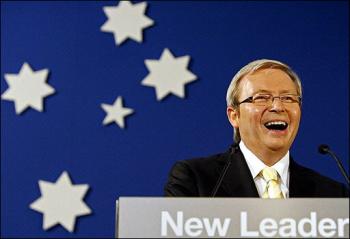Labor wins government after 11 years
After 11-and-a-half years in opposition, Kevin Rudd has led the Australian Labor Party to victory.
Kevin Rudd and the Australian Labor Party (ALP) have been elected to govern Australia after 11 and a half years of conservative rule under John Howard. Polls had been predicting a Labor landslide all year, and whilst this election result wasn’t quite a landslide, it was certainly a decisive win for Labor.

Kevin Rudd addresses the nation in Canberra after being elected as Prime Minister.
(Photo © Agence France-Presse, 2007)
The ALP finally got a good leader in Kevin Rudd. Articulate, intelligent and personable, he was able to join the factionalised ALP together and present a fresh and unified face to the Australian public where Kim Beazley, Mark Latham and Simon Crean couldn’t. His appeal was considerable and for the first time in years the ALP was ahead in the polls.
All year there had been questions about Mr. Howard’s retirement plans. Howard eventually announced in September that he’d retire “well into the next term of government”, paving the way for the unpopular Peter Costello to potentially become PM. The threat of late leadership challenges from Costello required Howard’s contstant vigilance which distracted him from the important task of winning an upcoming election.
Howard’s credibility on economic management had been seriously undermined by interest rate rises that Mr. Howard had promised would not occur during the 2004 election campaign. His now infamous “who do you trust?” campaign was coming back to bite.
Furthermore, the crippling drought had hurt many people in both the cities and the country (most especially in 2006) and had convinced many of the importance of climate change as an issue, regardless of whether the drought was caused by it or not. In any case, Mr. Howard’s refusal to take climate change seriously or ratify the Kyoto Protocol was becoming a serious electoral liability.
Add to this mix the hideously unpopular industrial relations reforms (so-called “Work Choices“) which effectively stripped the rights and working conditions from millions of people and the Liberal Party was always going to face an uphill battle for re-election.
Once the campaign was announced, things only went from bad to worse for the government. With a confident Kevin Rudd promising reform of the public hospital system, an “education revolution”, carbon emission targets, Kyoto ratification, national broadband plan and the abolition of Work Choices; the government could only muster a negative campaign about the risks of “wall-to-wall Labor across the country”. The Liberals were offering very little actual policy to inspire the people of Australia.
Health Minister Tony Abbott’s performance during the campaign was particularly notable. Abbott said high-profile asbestosis-sufferer Bernie Banton that being ill didn’t make him pure of heart, much to the disgust of everyone concerned. In another incident, he turned up half-an-hour late to a live televised debate in Canberra where he proceeded to swear at his Labor opponent.
Then mid-campaign, the Commonwealth Auditor-General released a damning report about a rural projects funding scheme that didn’t meet “acceptable standards of public administration”. The report found that projects were far more likely to be approved in Liberal seats than Labor, regardless of their merit. When confronted with this, the Deputy PM and National Party leader Mark Vaile questioned the independence of the auditor-general and suggested a future government should muzzle him!
The final nail in the coffin came for the government with the “dirty tricks campaign” in the seat of Linsay (New South Wales). Howard’s Liberal Party admitted it had been forced to expell two members after they distributed a Fake Labor Party flyer falsely linking the Labor Party to Islamic extremist bombers. The Australian Electoral Commission and Australian Federal Police are likely to press charges on this matter.
Following these scandals, and a general laclustre performance overall, the polling was showing a Labor Party landslide in all states and territories except Western Australia. Queensland was the state predicted to have the largest swing to Labor.
In the end, that’s what happened. Labor was swept to power after nearly 12 years in opposition, and the Governor-General will swear in Kevin Rudd as Prime Minister this week. The Senate results are still unknown, but it is likely that new South Australian Senator Nick Xenophon and The Greens may hold the balance-of-power.
I shall watch with considerable interest to see how Labor implements it’s social reform plans. In particular I’ll be keen to see how they manage their mandate to abolish the harsh industrial relations laws, withdraw from Iraq, and manage climate change and the impact of drought.
Comments
No comments have yet been submitted. Be the first!